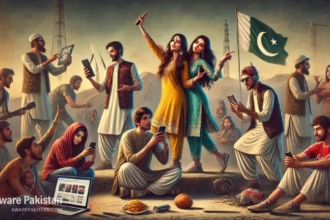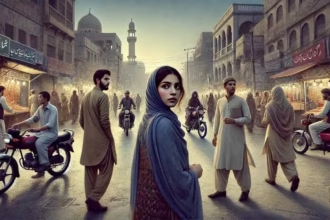The word “Westernization” is something that you hear a lot nowadays. You may wonder what it means exactly and how it corresponds with Pakistan.
As per the Collins dictionary, “westernization” is defined as “the process of adopting ideas and behaviors that are typical of Europe and North America, rather than preserving the ideas and behaviors traditional to their culture.”
This word was first coined by M.N. Srinivas in order to explain the changes that came forth in Indian society and culture due to Western contact, aka British rule. So, essentially, the concept of Westernization took flight after the British landed on the Indian subcontinent.
Despite the 800-year-long rule by Muslims on the subcontinent, the British took hold of the area with considerable ease. They came in, established their institutions and policies, and ruled over India for almost 90 years. This was bound to leave some long-lasting impacts on the future generations of the region.
By 1947, the literacy rate had dropped to 16%, life expectancy had dropped to 31, and nearly 90% of the Indian population was poor.
For almost 90 years, the British had a hold on the region, changing its societal, cultural, developmental, and political dynamics forever. With their Western ideologies and norms, the British changed the subcontinent entirely, starting with the region’s economy.
Before British rule, at the time of the Mughal Empire, the Indian subcontinent comprised around 23% of the world’s economy. By 1947, it had been reduced to 4%. The reason for this is that Britain’s industrialization was entirely dependent on India’s deindustrialization. They exploited the resources of the region and used them for their own development.
Similarly, life expectancy and literacy rates were exceptional, essentially on par with those in Europe before British rule. By 1947, however, the literacy rate had dropped to 16%, life expectancy had dropped to 31, and nearly 90% of the Indian population was poor.
As a result, the West has had a significant impact on the Indian subcontinent.
From day one, there is no initiative to create a constitutional framework from scratch; rather, Pakistan has taken advantage of the framework established by the West.
With such a history, when Pakistan came into being, it was definitely not a very strong state. The subcontinent had been almost ruined by the British Empire, and the good bits that were left behind mostly went to India. This left Pakistan in a vulnerable position, as it was neither economically nor culturally strong.
Thus, the westernization of Pakistan started way before its conception. However, things did not get any better after gaining independence.
Westernization of Pakistan’s Development
After 1947, Pakistan adopted the Government of India Act of 1935 until the formulation of its own constitution. Thus, from day one, we see that there is no initiative to create a constitutional framework from scratch; rather, Pakistan has taken advantage of the framework established by the West.
Along the way, certain leaders like General Zia did try to bring about Islamization and change the narrative, but the means used for this process were not ideal and eventually ended up being fruitless. Instead, Pakistan embarked on a protracted pursuit of the Western world.
Pakistan adopted the system and policies that the West recommended without taking into consideration the long-term impacts of such policies. In order to develop itself, Pakistan looked to the West, and somewhere along the way, the lines between development and westernization started blurring.
The issue is that Pakistan has never explored its own developmental needs and requirements. Its goal was always to get to where the Western world was. But Pakistan needs to conduct extensive research in order to understand what it needs and what the best path is to fulfill those needs. Without sound literature to rely on, Pakistan is just blindly assuming that Western research resonates with it as well.
Other than that, there is a lack of cultural integration with the development policy. Pakistanis in general hold high regard for Western modernity. They consider it the end goal, and this is often depicted in the developmental policies designed by policymakers. Policymakers need to start designing policies that move away from westernization.
Despite the pressure of hosting millions of people from the Western world during the FIFA World Cup, Qatar did not compromise on its values.
The leaders and politicians of the country need to design such policies and introduce such systems that instill a sense of ownership of their own culture. Just like Qatar did in the FIFA World Cup. Despite the pressure of hosting millions of people from the Western world, it did not compromise on its principles. It banned alcohol in stadiums; it put forth a no-tolerance policy against LGBTQ trends, showing that it values its policies and that it will change the norms for no one.
A westernized mindset has resulted in a development system that reaps little benefit from the policies put in place. So there is a need to decolonize the minds of the masses. The people of Pakistan need to learn how to unlearn the ages-old customs and traditions of the West.
They need to learn the importance of their own culture and heritage because, as long as the mindset of Western superiority prevails, there is no way to get out of the loop that they are stuck in.
As a society, they need to think about why the Western way of doing things is the norm. Why do they believe that their culture, systems, or religion are not as valuable as, if not more valuable than, those of the West? But most importantly, they need to think about how long they are willing to stay stuck in this vicious race of Western modernity.
Conclusion
The impact of colonization is long-lasting and mostly not very productive. The region that comprises Pakistan was previously ruled by the Mughals until the British colonized the land. Thus began a long period of Western rule.
The colonized history of Pakistan has made it more West-oriented in terms of its culture, its policies, and its way forward. The development of the country has been slow due to this very reason. There is a lack of realization that the Western world is not their world. They need to create systems and policies that work properly for them. Blindly following the West is not going to reap the benefits that they aim to sow.








